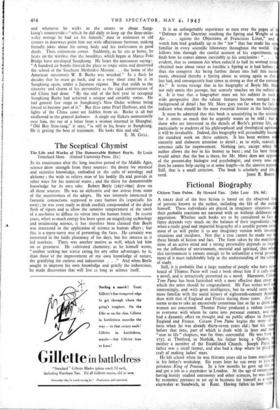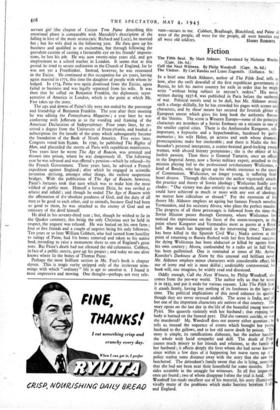Fictional Biography ,
Citizen Tom Paine. By Howard Fast. (John Lane. 10s. 6d.) A GREAT deal of the best fiction is based on the observed of persons known to the author, including the life of the auth himself. These individuals are placed in imaginary situations a their probable reactions are narrated with or without deliberate e aggeration. Whether such books are to be considered as fact fancy depends very much on the balance of their ingredients ; b when a really good and impartial biography of a notable person exis most of us will prefer it to any imaginary version with invent situations and incidents. Not that a case cannot be made out these blends of fiction and fact. The form taken by the manife tions of an active mind and a strong personality depends so larg on the influence of environment, material and spiritual, that wh this environment is remote enough to be unfamiliar a vivid prese menu of it must indubitably help in the understanding of the subj of study. Still, it is probable that a large number of people who have no heard of Thomas Paine will read a book about him if it calls its a novel, and is attractively presented as a novel. Moreover, Citiz Tom Paine has been furnished with a most effective dust cover which- the artist should be congratulated. Mr Fast writes well a interestingly, and with great intelligence, but he would seem to more familiar with the social history of eighteenth-Century Amer than with that of England and France during those years. Also seems to me to take an excessively censorious line so far as drink a women are concerned. Thomas Paine produced a violent react' in everyone with whom he came into personal contact, and a had a ,dynamic effect on thought and on public affairs in Amen England and France. Citizen Tom Paine begins the story of hero when he was already thirty-seven years old ; but his car before that time, part of which is dealt with in later and in " true to life " chapters, was -far from uneventful. He was born 1737, at Thetford, in Norfolk, his father being a Quaker, mother a member of the Established Church. Joseph Paine father was a small fanner, and also had a shop where he plied craft of making ladies' stays. He left school when he was thirteen years old to learn staymak. in his father's workshop. Six years later he ran away to join privateer,King of Prussia. In a few months he gave up the 5 and got a job as a staymaker in London. At the age of twenty- having keenly studied astronomy and other sciences, he was driv by economic pressure to set up in business for himself as a s staymaker at Sandwich, in Kent. Having fallen in ' ma love with servant girl (the chapter of Citizen Tom Paine describing this emotional phase is comparable with Meredith's description of the falling in love of the more aristocratic Richard and Lucy), he married her ; but his wife died in the following year. He then gave up his business and qualified as an exciseman, but through following the prevalent custom of casting a favourable eye on his friends' importa- tions, he lost his job. He was now twenty-nine years old, and got employment as a school teacher in London. It seems that at this period he tried to secure ordination in the Church of England. for hr was not yet a Freethinker. Instead, however, he was reinstated in the Excise. He continued at this occupation for six years, having again married in 1771, this time the daughter of people with whom he lodged. In 5774, Paine was again dismissed from the Excise, again failed in business and was legally separated from his wife. It was then that he called on Benjamin Franklin, the diplomatic repre. sentative of America in London, which is the point at which Mr. Fast takes up the story.
The ups and downs of Paine's life were not ended by the patronage and friendship of Benjamin Franklin. The year after their meeting he was editing the Pennsylvania Magazine ; a year later he was conferring with Jefferson as to the wording and framing of the American Declaration of Independence: Four years later, he re- ceived a degree from the University of Pennsylvania, and headed a subscription for the benefit of the army which subsequently became the foundation of the Bank of North America. Five years later, Congress voted him $3,000. In 1791, he published The Rights of Man, and placarded the streets of Paris with republican manifestoes. Two years later he wrote The Age of Reason, was arrested and thrown into prison, where he was dangerously ill. The following year he was released and was offered a pension—which he refused—by the French Government. Three years later, he advised a French expedition against England ; after which he engaged in scientific invention devising, amongst other things, the earliest suspension bridges. With the publication of The Age of Reason, however, Paine's fortunes took that turn which was to make him the most vilified of public men. Himself a fervent Deist, he was reviled as atheist and infidel ; and though he ended The Age of Reason with the affirmation of the'absolute goodness of God, and the duty of all men to be good to each other, and to animals, because God had been so good to them, he was attacked as the enemy of God and an emissary of the devil himself.
He died in his seventy-third yearbut, though he wished to lie in the Quaker cemetery, this being the only Christian sect he held in respect, the request was refused. He was buried on his own farm ; four or five friends and a couple of negroes being his only followers. Ten years or so later William Cobbett, who had turned from hostility to eulogy of Paine, had his bones removed and taken to his native land, intending to raise a monument there to one of England's great sons. But Paine's death had not silenced the old calumnies. Cobbett, in face of a public outcry, gavt up his project ; and today no one alive knows where lie the bones of Thomas Paine.
Perhaps the most brilliant section in Mr. Fast's book is chapter eleven. This is tragic verity stripped only of the irrelevant trim- mings with which " ordinary " life is apt to smother it. I found it most impressive and moving. One thought—perhaps not very rele-
vain—occurs to me. Cobbett, Bradlaugh, Blatchford, and Paine J'■ were of the people, all were for the people, all were heretics aasi



























 Previous page
Previous page